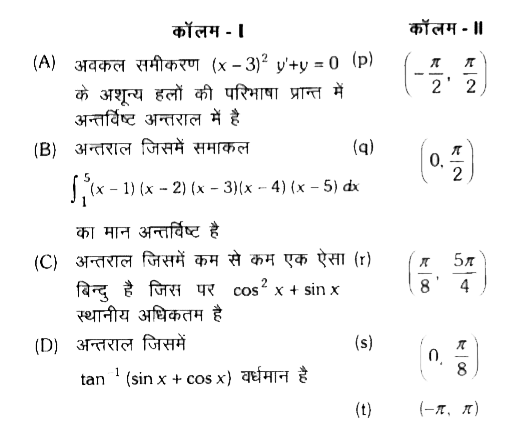माना फलन f:(−∞,∞)→(−∞,∞),
f(x)=x2−ax+1x2+ax+1,0<a<2 द्वारा परिभाषित है
निम्न में से कौन सा सत्य है
f(x),(−1,1) पर ह्यसमान है एवं इसका x=1 पर एक स्थानीय निमनिष्ठ है
f(x),(−1,1) पर वर्धमान है एवं इसका x=1 पर एक स्थानीय उच्चिष्ठ है
f(x),(−1,1) पर वर्धमान है परन्तु इसका x=1 पर न तो स्थानीय उच्चिष्ठ है और न ही स्थानीय निमनिष्ठ है
f(x),(−1,1) पर ह्यसमान है परन्तु x=1 पर न तो स्थानीय उच्चिष्ठ है और स्थानीय निमनिष्ठ है
The correct Answer is:A
Step by step video, text & image solution for माना फलन f:(-oo,oo)to(-oo,oo), f(x)=(x^(2)-ax+1)/(x^(2)+ax+1),0ltalt2 द्वारा परिभाषित है निम्न में से कौन सा सत्य है by Maths experts to help you in doubts & scoring excellent marks in Class 12 exams.
Topper's Solved these Questions
- BOOK - ERRORLESS HINDICHAPTER - अवकलन तथा अवकलज के अनुप्रयोगEXERCISE - JEE Advanced (Integer type questions)30videos
अवकलन तथा अवकलज के अनुप्रयोग
- BOOK - ERRORLESS HINDICHAPTER - अवकलन तथा अवकलज के अनुप्रयोगEXERCISE - JEE Advanced (Matrix Match type questions)22videos
अवकलन तथा अवकलज के अनुप्रयोग
- BOOK - ERRORLESS HINDICHAPTER - अवकलन तथा अवकलज के अनुप्रयोगEXERCISE - JEE Advanced (Reasoning thye questions)26videos
अवकलन तथा अवकलज के अनुप्रयोग
- BOOK - ERRORLESS HINDICHAPTER - अवकल समीकरण EXERCISE - JEE Advanced ( Matrix Match type questions )3videos
अवकल समीकरण
- BOOK - ERRORLESS HINDICHAPTER - केन्द्रीय प्रवृत्ति के मापEXERCISE - Jee Advanced (Reasoning )2videos
केन्द्रीय प्रवृत्ति के माप
Similar Questions
वास्तविक संख्याओं a−5,a−4,3a−3,1,a8 और a10 का निम्नतम योग ,जबकि a>0 है , होगा
06:02View Solutionकॉलम I में दिये गये वक्तव्यों का कॉलम II में दिये अंतरालों अथवा अंतरालों के सम्मिलन से सुमेल करें
कॉलम -Iकॉलम - II(A)समुच्चय{Re(2iz1−z2):zएकसम्मिश्र संख्या है|z|=1,z≠±1}है(p)(−∞,−1)∪(1,∞)(B)फलनf(x)=sin−1(8(3)x−21−32(x−1))का प्रान्त है(q)(−∞,0)∪(0,∞)(C)यदिf(θ)=∣∣ ∣∣1tanθ1−tanθ1tanθ−1−tanθ1∣∣ ∣∣,तब समुच्चय{f(θ):0≤θ<π2}है(r)[2,∞)(D)यदिf(x)=x3/2(3x−10),x≥0,तबf(x)किसमे वर्धमान है(s)(−∞,−1]∪[1,∞)(t)(−∞,0]∪[2,∞)03:21View Solutionमाना f(x)=2+cosx , सभी वास्तविक x के लिए कथन - 1 : प्रत्येक वास्तविक t के लिए , [t,t+π] में एक बिंदु c का अस्तित्व इस प्रकार है कि f'(c)=0. क्योंकि
कथन -2 f(t)=f(t+2π) प्रत्येक वास्तविक t के लिए।06:24View Solution 03:37View Solution
03:37View Solutionकथन - 1 : प्रथम n सम धन पूर्णांकों का प्रसरण n2−14 है।
कथन - 2 : प्रथम n धन पूर्णाको का योगफल n(n+1)2 और प्रथम n धन पूर्णांको के वर्गों का योगफल n(n+1)(2n+1)6 है।View SolutionConsider the function f:(-oo,oo)rarr(-oo,oo) defined by f(x)=(x^(2)-ax+1)/(x^(2)+ax+1);0
03:42View Solutionf:(-oo,oo)rarr(-oo,oo) is defined by f(x)=ax+b,a,b in R(a!=0) then F is
04:53View SolutionConsider the function f:(−∞,∞)→(−∞,∞) defined by f(x)=x2−ax+1x2+ax+1,0<a<2, and let g(x)=∫ex0f'(t)dt1+t2. Which of the following is true? (A) g'(x) is positive on (−∞,0) and negative on (0,∞) (B) g'(x) is negative on (−∞,0) and positive on (0,∞) (C) g'(x) changes sign on both (−∞,0) and (0,∞) (D) g'(x) does not change sign on (−∞,∞)
03:47View SolutionConsider the function f:(−∞,∞)→(−∞,∞) defined by f(x)=x2−ax+1x2+ax+1;0<a<2. Which of the following is true?
05:23View SolutionConsider the function f:(−∞,∞)→(−∞,∞) defined by f(x)=x2−ax+1x2+ax+1;0<a<2. Let g(x)=∫ex0f'(t)1+t2 dt. Which of the following is true?
04:06View SolutionIf f:[1,∞)→[1,∞) is defined by f(x)=2x(x−1) then find f−1(x).
View SolutionIf f[1,∞)→[1,∞) is defined by f(x)=2x(x−1) then f−1(x)=
07:35View SolutionConsider the function f : (−∞,∞)→(−∞,∞) defined by f(x) = x2−ax+1x2+ax+1,0<a<2
Let g(x)=ex∫0f'(t)1+t2dt
Which of the following is true ?07:44View Solutionअंतराल [0, 2] में f(x)=2+(x−1)2/3 द्वारा परिभाषित फलन f है | निम्न में से कौन सही नहीं है ?
06:18View SolutionIf f(x)={x3,ifx2<1andx,ifx2≥1 then f(x) is differentiable at (a) (−∞,∞)−{1} (b) (−∞,∞)−{1,−1} (c) (−∞,∞)−{1,−1,0} (d) (−∞,∞)−{−1}
View Solutionकॉलम I में दिये गये वक्तव्यों का कॉलम II में दिये अंतरालों अथवा अंतरालों के सम्मिलन से सुमेल करें
कॉलम -Iकॉलम - II(A)समुच्चय{Re(2iz1−z2):zएकसम्मिश्र संख्या है|z|=1,z≠±1}है(p)(−∞,−1)∪(1,∞)(B)फलनf(x)=sin−1(8(3)x−21−32(x−1))का प्रान्त है(q)(−∞,0)∪(0,∞)(C)यदिf(θ)=∣∣ ∣∣1tanθ1−tanθ1tanθ−1−tanθ1∣∣ ∣∣,तब समुच्चय{f(θ):0≤θ<π2}है(r)[2,∞)(D)यदिf(x)=x3/2(3x−10),x≥0,तबf(x)किसमे वर्धमान है(s)(−∞,−1]∪[1,∞)(t)(−∞,0]∪[2,∞)07:50View Solution
